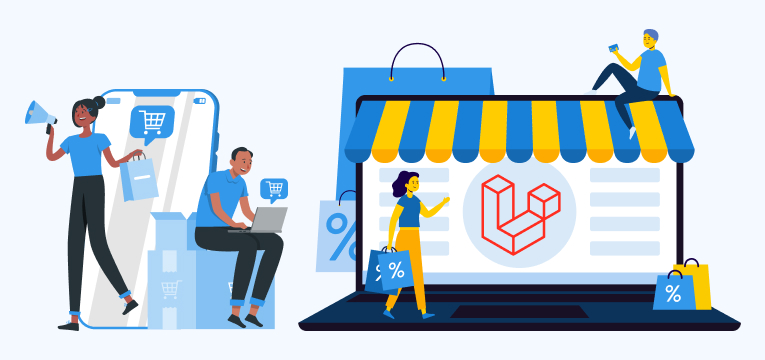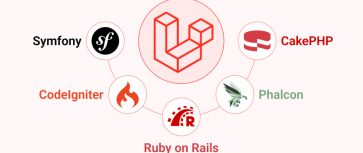Laravel Ecommerce Packages: Which One to Choose?
If you don’t have a truly special product or service to sell online, your ecommerce website will blend in with the others.
In order to create better user experiences and stay ahead of the competition, you must have a solid eCommerce development platform. And the top programmers put it all into action!
This article focuses on the Laravel eCommerce package, a prominent option for creating online stores. You have found the appropriate piece of material if you are wondering whether or not to engage Laravel developers India for your online business.
1. Laravel & e-Commerce: Quick Context

Laravel is a popular PHP framework that can be used to create websites and online web apps. It offers an easy learning curve, eliminates several construction oddities in PHP, and includes numerous up-to-date libraries. Some have compared it to the PHP version of Ruby on Rails.
Composer() is a dependency and package manager that is fully supported by the Laravel framework. You can speed up your Laravel development process with the help of several handy packages. Consider issues like bug tracking, user authentication, API calls, and so forth. You may find useful Laravel packages on platforms like Packagist and Packalyst.
Laravel version 8 has been accessible to the general public since September 2020. Included are enhancements to rate limitation, task batching, dynamic Blade components, Tailwind pagination views, time testing aids, and the Laravel Jetstream.
2. Reasons to Choose Laravel for Your eCommerce Store
Let’s investigate the most compelling arguments for using Laravel for your online shop’s framework.
1. It’s Highly Scalable
Your first customer base may be small and light but it has the potential to expand. Your online reach and popularity will suffer if your ecommerce shop can’t handle a surge in traffic. You won’t just stop receiving leads, but some of your dedicated consumers may also stop buying from you.
When using Laravel for e-commerce development, this problem is easily fixed. Web apps made using Laravel are flexible and quick to load. If you don’t utilize a content management system (CMS), your website will always be up-to-date and quick to load for visitors. In order to create complex, robust applications, the framework offers the necessary building blocks. For improved scalability, your web developer should employ a solid load balancer and database design.
2. Adaptability
Laravel framework provides out-of-the-box support for essential eCommerce features including product catalogs, shopping carts, payment processing through various ecommerce payment gateways, and more. You can use them as-is or alter them to meet your requirements.
Laravel allows you to create unique eCommerce solutions to meet the needs of your company and its customers. Several Laravel ecommerce packages like Bagisto, Aimeos, GetCandy, Vanilo, Bazar, etc., can simplify eCommerce development.
3. Extremely Secure
There are various risks that must be considered while creating an online store: hacking, fraudulent purchases, loss of client information, etc. Your online shop may be at risk of cyber assaults if you have such security flaws.
With Laravel, you can construct highly secure online apps that shield your business and its clients from danger. Your Laravel based software will be ready for prime time thanks to the improved and optimized server and security.
4. SEO Regulation
The promotional efforts you put into your online ecommerce shop will determine how successful it will be. Generating SEO-friendly URLs and readily implementing SEO methods are both essential to the profitability of your online shop.
Many helpful third party plugins and tools exist in Laravel to assist in this endeavor. With its SEO-friendly code, customers will have no trouble finding your online business. In simple terms, you can prioritize improving your SEO approach with the resources at your disposal, allowing for swift and accurate indexing.
5. Effortless Third-Party Integrations
Launching a multi-vendor eCommerce store would necessitate additional apps for payment gateway integration, advertising, sales, customer relationship management, enterprise resource planning, etc.
You can make sure these third party apps work seamlessly with your website while creating an e-commerce website in Laravel. Several external e-commerce APIs and applications can coexist peacefully on the Laravel platform.
6. Effective Product Management
When deciding on the best technology for your B2B eCommerce site, remember to prioritize the simplicity of managing your products. It should be easy to update or remove content or goods. With Laravel, it’s easy for anybody to maintain the site’s blog or add new products to the online store.
7. Laravel Forge Makes It Simpler to Deploy
Laravel eCommerce is popular because it can be easily deployed using Laravel Forge. Using a server administration tool like this, setting up your online shop is a breeze. Redeployment is one issue that may be eliminated, along with the associated costs.
3. Top Laravel eCommerce Packages
3.1 Bagisto

Bagisto is a Laravel-based, vue.js-powered e-commerce platform that anybody may use for no cost. With the goal of assisting users of all experience levels in creating and expanding their online stores, the software was developed with user-friendliness as a main focus. It provides full management capabilities and a wide variety of useful features for your online shop.
The Laravel framework makes managing products simple, giving business owners the flexibility to release products in response to customer demand. Even for the technologically inept, Bagisto offers ease of use and adaptability. It reduces the time, money, and effort required for establishing an online business or switching from a physical to a digital business.
3.1.1 Pros and Cons of Bagisto
Pros:
- Offers the ability to customize, organize, bundle, and sell digital products.
- Supports sales on several channels and in different locations.
- Allows for the implementation of discount regulations.
- APIs that use JSON REST and GraphQL.
- Provision made for the establishment of individual marketplaces.
Cons:
- Not compatible with pre-existing Laravel projects.
- Inadequate support for multiple currencies; only one can be converted.
- Almost the majority of the available payment gateways have a price tag of 100 tables, which often includes rigid, unscalable table architectures.
- Fast searching should be performed with ElasticSearch or Algolia.
- The CMS features are too basic to be useful.
- Inadequate documentation.
3.2 LaravelShoppingcart
Small, intuitive, and with few options, this shopping cart software is ideal for beginners. You’ll be responsible for implementing product handling and checkout in your current Laravel apps; this package just provides a shopping cart and a wish list.

This Laravel Ecommerce platform is very popular in GitHub, it has 3.6k stars and 1.7k forks.
3.2.1 Pros and Cons of LaravelShoppingcart
Pros:
- Intuitive and simple to implement for Laravel programmers.
- Including shopping cart functionality for pre-existing items.
Cons:
- Very few options are available for use.
- There isn’t any kind of shopping cart checkout option.
- Not scalable to large amounts of data.
- Lacks a sample template for use.
3.3 Aimeos Laravel

When it comes to Laravel’s many ecommerce packages, Aimeos Laravel is by and away the most often used option. Along with the capabilities necessary to construct a fully operational Laravel shopping cart, it also includes a number of advanced features, like support for several programming languages, theme customization, and search engine optimization (SEO) tools.
When coupled with a well-tuned web server and robust database management system, the Aimeos package provides lightning-fast website loading times at no cost to the user.
3.3.1 Pros and Cons of Aimeos
Pros:
- Quickly adapts to new releases of Laravel.
- GraphQL backend API with frontend JSON REST API.
- Support for multiple channels, sellers, and stock levels.
- SaaS allows for multiple users and custom domains.
- Response times of 100ms and render times of 20ms are considered ultra-fast.
- Includes virtual, adjustable, and individualized offerings, as well as packages.
- Create a subscription model for all of your offerings.
- Discount policies and coupons are supported.
- Over a hundred different payment options are accessible using the Omnipay PHP library.
- Detailed resources are readily available.
Cons:
- Due to its extensive functionality, it takes more effort to master.
3.4 Lunar

Taking the place of GetCandy, Lunar is a REST API-only package with an admin UI to handle your store’s inventory, purchases, and users. There is no user interface because it is intended to be used in conjunction with custom-built web applications.
3.4.1 Pros and Cons of Lunar
Pros:
- Server-side code that supports PWAs.
- Makes use of ElasticSearch, a scalable document store, to handle data.
Cons:
- There’s no demo user interface to look at.
- There is currently only a basic set of features available.
- There is no monetary integration.
- Poor documentation.
- Presently in the alpha stage.
- Currently, the future appears a bit dubious.
4. Tools That Optimize Laravel-Based Ecommerce Stores
Many resources exist to assist with the enhancement of e-commerce sites built using the Laravel framework. Here we have highlighted a select handful to illustrate their functions and show how they improve the efficiency of a Laravel online store.
1. PHP-FPM: One of the most popular tools for increasing the performance of PHP applications is by using PHP-FPM. It’s simple for programmers to include Laravel-based programs to boost their efficiency.
2. Redis: Redis is a useful tool for reducing the time it takes for web apps to load their caches, and it integrates smoothly with those built with the Laravel framework.
3. CDN: Fast data transfer to and from the necessary servers is provided by a content delivery network (CDN), another crucial factor in improving web app performance. Because expanding your audience demands rapid content delivery, CDN’s primary goal is to improve response times.
5. Conclusion
Building a safe, adaptable, and reliable eCommerce platform is no easy task. With the correct technology and development team, however, these obstacles can be addressed.
Clearly, you can build reliable eCommerce solutions with Laravel’s help. It offers a large user base, simple deployment methods, and a wealth of e-commerce-specific plugins to aid developers.
Why wait further to discover the ideal group to meet your Laravel eCommerce project needs if you already made up your thoughts? Get in touch with us right now!
6. FAQs
6.1 Is Bagisto Open-Source?
Yes! Bagisto is an open-source eCommerce platform because it is released under the MIT License. Hence, the Bagisto e-commerce framework is freely available to anybody. There is a large selection of add-ons and plugins available for use with Bagisto.
6.2 Is Laravel Good for eCommerce?
Laravel offers several built-in benefits that make it an ideal framework for e-commerce web applications like online stores and marketplaces. Laravel provides code structure and optimization which will enhance application speed.

Hardik Dhanani has a strong technical proficiency and domain expertise which comes by managing multiple development projects of clients from different demographics. Hardik helps clients gain added-advantage over compliance and technological trends. He is one of the core members of the technical analysis team.
To obtain great performance and scalability, Laravel caching is crucial. If you want to avoid slow APIs and page loads, adopt the suitable caching strategy...
 Aug 29, 2023
Aug 29, 2023 



Comments
Leave a message...